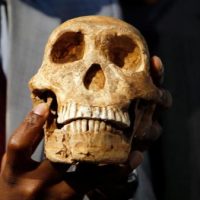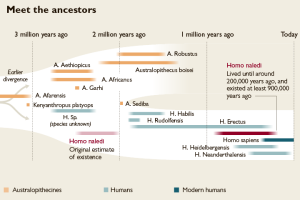Bones reveal we shared planet with primitive cousins 240,000 years ago

Did they meet? Beneath the South African sun, did our ancestors come across a strange humanlike tribe with small skulls and an unusual method of burying the dead? Did they live alongside each other and even breed?
These are the tantalizing questions occasioned by the discovery that a new species of human ancestor, identified from bones found in a hidden cave, lived so recently that it may have overlapped with Homo sapiens. With bones such as this being unearthed it would make anybody want to know more about the past and where we come from. DNA test kits and websites similar to https://www.genealogybank.com/explore/census/all are filled with people trying to track down their family tree and lineage, they may not go all the way back to the dawn of time, but it gives an idea and somewhere to feel connected to. This discovery is certainly one for the history books.
The discovery of Homo Naledi at a site about 30 miles northwest of Johannesburg was one of the most sensational in modern palaeoanthropology. At the back of a complex cave system in the Cradle of Humankind world heritage site, through an opening so narrow you would have to hold one arm above your head to fit your shoulders through, cavers happened upon the graveyard of a species never before seen.

The 1,500 bone fragments making up at least 15 skeletons were difficult to date. Some features, such as the wrists and hands, were similar to those in modern humans, while the curved, tree-gripping fingers and smaller brain seemed more primitive. When the find was revealed 18 months ago, the best guess dated them to between two and three million years ago.
Now a complex dating process has found that this estimate was out by a factor of ten. A suite of techniques, each performed by laboratories working independently from each other, looked at the sedimentation in the caves, tooth enamel and other key markers, and found that the bones were about 335,000 years old, and may be as recent as 236,000 years old.
This means that the earliest humans in Africa, who were evolving during this period, may not have been alone. Scientists believe Homo naledi could have thrived for hundreds of thousands of years before we came on the scene, and like species such as Neanderthals, could even live on in our DNA as a result of interbreeding.
“It’s clear the species comes from deep time but its genus comes down through the generations very close to us,” said Lee Berger, of the University of the Witwatersrand, whose team discovered the bones. “It is very possible that Homo naledi, this small-brained non-human species, actually encountered Homo sapiens.”
One of the more intriguing and controversial theories about Homo naledi posits that the chamber where its bones were found was a ritual burial site.
Professor Berger believes that the dead were pushed through the tiny opening as part of a funeral ceremony, which would explain how so many bones ended up in the same cave. This theory received a boost from another excavation in a neighbouring chamber, which found the same pattern of bones.
Professor John Hawks, an anthropologist from the University of Wisconsin-Madison, who led the excavation of the second cave, said that together the discoveries called into question science’s assumptions about evolution.
“We thought that humans were invincible, that as we evolved we were crowding out every possible competitor and that the story was a simple one, where you have a lineage become aggressively more humanlike with bigger and bigger brains and more sophisticated behaviour,” he said.
“Now the best-represented and best-dated fossil assemblage in this time period in Africa is Homo naledi.
“We have to answer how these hominid populations may have interacted with each other, what role they may have had in our own origins, where our ancestors fit into this diverse and potentially very competitive environment. It’s an exciting time and we expect there will be many more discoveries in the years to come.”




